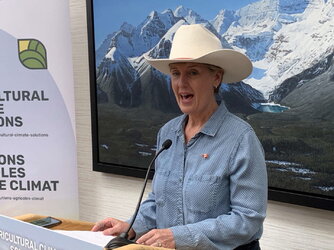
Marie-Claude Bibeau, Minister of Agriculture and Agri-food, speaks during a press conference announcing announcing $16 million in funding for Living Laboratories in Alberta during an Alberta Beef Producer?s summit at the Hyatt Regency in Calgary on Thursday, July 14, 2022.
Provincial agriculture ministers are expressing frustration with the Trudeau government over plans to effectively reduce fertilizer use by Canada’s farmers in the name of fighting climate change.
A meeting of federal and provincial ministers wrapped up in Saskatoon on Friday with several provinces saying they are disappointed.
The federal government is looking to impose a requirement to reduce nitrous oxide emissions from fertilizers saying it is a greenhouse gas contributing to climate change. While the Trudeau government says they want a 30% reduction in emissions, not fertilizer, farm producer groups say that at this point, reducing nitrous oxide emissions can’t be done without reducing fertilizer use.
“Provinces were disappointed by the lack of flexibility and consultation regarding the federal target,” Ontario’s Lisa Thompson said after the meeting.
Several provincial governments, and organizations representing farmers have asked for emissions reductions from fertilizer to be measured via intensity – how much food is produced compared to the amount of fertilizer used. The Trudeau government is demanding an absolute reduction in emissions, which farmers say will result in less food being produced at a time when the world can ill afford it.
“The world is looking for Canada to increase production and be a solution to global food shortages. The Federal government needs to display that they understand this,” Alberta minister Nate Horner said
Article Link
Archive